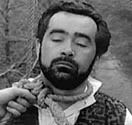Another interesting movie with an interesting history that I never ever heard of! From Wikipedia:
An Occurrence at Owl Creek Bridge (French: La Rivière du hibou) is a 1962 French short film based on the short story of the same name by Ambrose Bierce first published in the 1891 collection Tales of Soldiers and Civilians. It was directed by Robert Enrico and produced by Marcel Ichac and Paul de Roubaix with music by Henri Lanoe. It won awards at the Cannes Film Festival and the Academy Awards. It was also screened on American television as an episode of The Twilight Zone.
 Synopsis
SynopsisA Civil War civilian prisoner is about to be hanged from Owl Creek Bridge. As he is dropped, the rope breaks, and he swims away, the soldier's bullets missing him. After avoiding capture, the man arrives at his home. He sees his wife and child. He runs toward his wife, she runs toward him. Just as they are about to fall into each other's arm's, his head and neck suddenly jerks back, and we see him hanging from the bridge. His escape was only in his imagination.
Other StuffTwo years after its production, the film was screened on American TV as part of the science fiction show The Twilight Zone. Producer William Froug saw the film and decided to buy the rights to syndicate it on American television. The transaction cost The Twilight Zone $10,000 — significantly less than the average of $65,000 they expended on producing their own episodes. However, Froug’s purchase allowed for the film to be aired only twice (the first airing was on February 28, 1964). Consequently, it is not included on The Twilight Zone’s syndication package, although it is included on Image Entertainment's DVD box set of the original series. The episode's introduction is notable for Rod Serling breaking the fourth wall even more than usual, as he explains how the film was shot overseas and later picked up to air as part of The Twilight Zone.
Opening narration“ Tonight a presentation so special and unique that, for the first time in the five years we've been presenting The Twilight Zone, we're offering a film shot in France by others. Winner of the Cannes Film Festival of 1962, as well as other international awards, here is a haunting study of the incredible, from the past master of the incredible, Ambrose Bierce. Here is the French production of An Occurence at Owl Creek Bridge. ”
Closing narration“ An occurence at Owl Creek Bridge—in two forms, as it was dreamed, and as it was lived and died. This is the stuff of fantasy, the thread of imagination...the ingredients of the Twilight Zone. ”
Awards * Won first prize for Best Short Subject at the 1962 Cannes Film Festival.
* Won the 1963 Academy Award for Live Action Short Film




